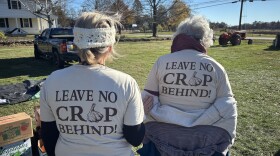Even in the best of times, farming in New England can be a profession full of anxiety and uncertainty. But Eve Klotz, a mental health care provider and farmer in Effingham, says she’s seen this year’s erratic weather take an especially big toll on her fellow farmers’ mental health.
“There's a lot of depression and despair right now with what's going on in Vermont and the Connecticut Valley in New Hampshire with the flooding,” she said. “Some of these farmers are just losing everything.”
Local producers have had to contend with numerous destructive events this growing season, including crop-killing freezes in February and May and heavy rains and flooding in July. They have seen months of hard work wiped away in hours. Many are now trying to figure out how to keep their businesses afloat with much of their income decimated.
Klotz has been providing counseling through Farm Strong NH, a recent initiative from the University of New Hampshire and the New Hampshire Department of Agriculture, Markets & Food that supports agricultural workers’ mental well-being. Klotz also helped conceptualize the program.
The program received a grant of about $500,000 through the U.S. Department of Agriculture. This money was expected to last through the end of August, but the program distributed all of it months earlier than scheduled.
“We had such a run on the requests for services in the spring that we ran out sooner than we were planning on,” said Seth Wilner, a UNH field specialist who helped design and administer the program.
Farm Strong NH offers services like counseling, social work, legal assistance and financial planning resources. It provided $1,440 to cover at least 12 therapy sessions. The money was distributed on a first come, first served basis.
Once the program knew it would use up its funds early, Wilner said his team contacted mental health vendors to provide closing visits to avoid cutting off care abruptly. These appointments must be conducted before Aug. 31. For prospective patients who sought help after the funds were already allocated, their only option was to join a waitlist.
Wilner said the initiative is working with state officials to secure additional funding to resume full operations as soon as possible.
He says it's critical at this point. “It could not have been worse given the frost, given the flood,” Wilner said.
Klotz worries about her clients in the meantime. “We’re in a crisis right now and [Farm Strong NH] basically isn't functioning,” she said.
A web of factors makes farming uniquely stressful and treating mental health issues amongst farmers particularly difficult. These obstacles have existed long before this year’s incidents. A 2020 Centers for Disease Control and Prevention study reported that farmers faced a higher than average suicide rate compared to other occupations.
Klotz described a pervasive “pull yourself up by your own bootstraps” attitude among agricultural workers – especially older generations – that stigmatizes asking for help.
The time and money required to seek treatment also creates insurmountable barriers for many. Klotz said many of her clients cannot afford continuing to see her once they use up their pre-paid visits.
It is common practice for therapists to recommend clients consider switching careers when experiencing acute workplace stress, Klotz explained. But she said this suggestion is a particularly daunting prospect for farmers, as their identities tend to be tied to their work.
“For a farmer to say they want to give up, they're giving up their lives. It's not like you decide to change jobs,” she said.
Klotz’s role as both a mental health counselor and a farmer helps her navigate these conversations. “It's just a little bit different cohort to work with for a therapist,” she said.
Klotz says New Hampshire could learn from neighboring states like Vermont and Maine. She says those states make more resources available for farmers.
“I don't think New Hampshire takes good care of its agriculture community or its mental health,” she said.
Both Wilner and Klotz hope Farm Strong NH finds more funding soon.
“We helped a lot of people,” she said. “There's a lot more out there for us to help.”








